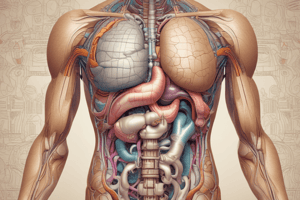Podcast
Questions and Answers
What is the primary function of the digestive system?
What is the primary function of the digestive system?
- To break down food into smaller parts (correct)
- To store food in the body
- To eliminate waste from the body
- To absorb nutrients into the bloodstream
What is the first stage of the digestive process?
What is the first stage of the digestive process?
- The stomach mixing food with digestive enzymes
- The small intestine absorbing nutrients
- The mouth mixing food with saliva (correct)
- The liver producing bile
What is the primary function of the liver in the digestive system?
What is the primary function of the liver in the digestive system?
- To store food in the body
- To produce digestive enzymes
- To process nutrients and produce bile (correct)
- To break down carbohydrates
What is the purpose of the gallbladder in the digestive system?
What is the purpose of the gallbladder in the digestive system?
What is the last part of the GI tract?
What is the last part of the GI tract?
What is the role of the pancreas in the digestive system?
What is the role of the pancreas in the digestive system?
What is the main function of the pancreas in the digestive system?
What is the main function of the pancreas in the digestive system?
What is the role of the gallbladder in the digestive system?
What is the role of the gallbladder in the digestive system?
What is the purpose of peristalsis in the digestive system?
What is the purpose of peristalsis in the digestive system?
What role do hormones play in the digestive system?
What role do hormones play in the digestive system?
What is the role of gut flora in the digestive system?
What is the role of gut flora in the digestive system?
What is the purpose of clinical trials in the digestive system?
What is the purpose of clinical trials in the digestive system?
Flashcards are hidden until you start studying
Study Notes
The digestive system is a complex network of organs and processes that allows the human body to process food and absorb nutrients. The digestive system is composed of the gastrointestinal tract (also known as the GI tract) and the liver, pancreas, and gallbladder. The GI tract is a series of hollow organs, including the mouth, esophagus, stomach, small intestine, large intestine, and anus, which work together to break down food and move it through the body.
The Digestive Process
Digestion is the process by which the body breaks down food into smaller, more manageable parts for absorption and utilization. This process begins in the mouth, where food is mixed with saliva, which contains enzymes that start the breakdown of carbohydrates. Chewing, the mechanical act of breaking down food, further prepares it for digestion.
The Gastrointestinal Tract
The GI tract is the part of the digestive system that processes food. It starts at the mouth and ends at the anus. The organs of the GI tract include the mouth, esophagus, stomach, small intestine, and large intestine. Each of these organs plays a specific role in the digestive process.
The Liver, Pancreas, and Gallbladder
These solid organs of the digestive system are responsible for producing and secreting various digestive juices and bile. The liver processes nutrients, detoxifies harmful substances, and produces bile, which aids in the digestion of fats. The pancreas secretes digestive enzymes that break down proteins, fats, and carbohydrates. The gallbladder stores and concentrates bile, releasing it into the small intestine when needed to aid in the digestion of fats.
Peristalsis
Peristalsis is the contraction and relaxation of the muscles in the walls of the GI tract, which pushes food and liquid through the digestive system. This muscle movement ensures that food moves from one organ to the next and is mixed with digestive juices along the way.
Nervous and Circulatory Systems
The nervous and circulatory systems work together with the digestive system to control digestion. Nerves signal the muscles of the GI tract to contract and relax, allowing food to move through the system. Hormones, such as insulin, are also involved in the digestive process, regulating the absorption of nutrients.
The Role of Bacteria
Bacteria in the gut, known as gut flora or microbiome, play a crucial role in digestion. They help break down food residues and produce vitamins that the body cannot produce on its own.
Clinical Trials
Clinical trials are ongoing research studies that help to advance our understanding of the digestive system and develop new treatments for digestive disorders.
Digestive System in Other Animals
The digestive system of animals varies greatly, with different species having adapted to their specific diets and environments.
Digestive System in Other Organisms
The digestive system of other organisms, such as plants, is also unique and adapted to their specific needs.
Interactive Learning
There are various interactive resources available that can help you learn more about the human digestive system and its functions.
Studying That Suits You
Use AI to generate personalized quizzes and flashcards to suit your learning preferences.




